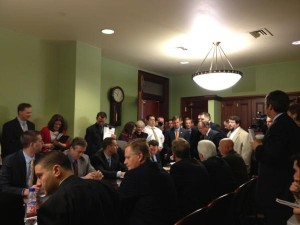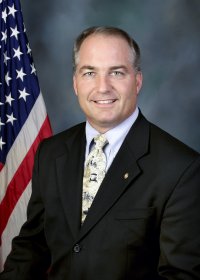Q & A: Benninghoff’s Post-Vote Answers Stay Vague
-
Scott Detrow
This morning, members of the House Finance Committee packed into a small, out-of-the-way conference room to vote on House Bill 1950, which had first been made public on the General Assembly website about twelve hours earlier.
Lawmakers debated the measure for about an hour, before approving it on a party-line 15-10 vote. The measure mirrors many of Governor Corbett’s Marcellus Shale priorities, including an initial $40,000-per-well impact fee.
The most contentious issue in the bill is a provision drafted by Corbett’s office, which preempts all local-level zoning ordinances.
After the meeting, reporters swarmed House Finance Committee Chair Kerry Benninghoff, to ask more questions about the measure. The gaggle grew contentious: and Benninghoff refused to provide a definitive answer on whether the measure overrides local ordinances. “In many cases, yes,” he said at one point. “Not necessarily,” was the response a few minutes later. When reporters followed up on the issue, he ended the interview.
At another point, a reporter asked why the vote wasn’t delayed, so that more people could read the 127-page bill that wasn’t posted until late last night. He responded, “This is not unfamiliar language. The governor’s proposal’s been out for three months.” In fact, most of the language was only made public for the first time last night.
Benninghoff also argued most Pennsylvanians do not understand the difference between an impact fee and a broader severance tax.
Here’s the full exchange:
Q: What sort of changes were made here?
A: Specifically, we’re codifying the Oil and Gas Act, and allowing that money to be put into environmental stewardship fund. In addition to that, we’re levying the impact fee, which I believe, across the commonwealth, was highly desired.
Q: …The changes to the Oil and Gas Act do what?
A: Specifically they’re giving setbacks and more protection for the landowners in where drilling can and can’t occur. Protection for the different water resources along those areas.
Q: Does this actually supersede local ordinances?
A: We believe it provides some standardization across the commonwealth, so many municipalities that may not have the resources, the ability or engineers on board within their own department, can have standard practices and protection for citizens and the environment.
Q: So it does, in that way, supersede local ordinances?
A: In many cases, yes.
Q: Can you give me the rationale for having an important issue like this heard in a tiny confererence room like this?
A: Yes, many of our rooms are reserved within weeks prior to the meetings. And I already had this meeting room reserved – its availability.
Q: Alright, but the Senate’s not in session. There weren’t other rooms you can use?
A: At this time, this was the room that was available to me. Anything else?

Pittsburgh Post-Gazette
Lawmakers crowd into the conference room, to vote on the impact fee measureGazette
Q: What’s the timetable for voting this on the floor?
A: I don’t control that. Matter of fact, I have to go speak with the leader to let him know it did come out of committee. Part of the goal was whether or not the bill could get out of committee. I think the 15-10 vote shows there’s pretty good support for it. I think the majority of members, both Republican and Democrat, feel they’d like to move forward with the initiative….
Q: Do you see the local option as an obstacle with the Senate, based on where they’ve been coming from so far?
A: I don’t think it’s a deal breaker. I think it’s something we can discuss with them. Nothing’s cemented at this moment, but I think it’s a very good step forward if we’re going to let this industry grow and provide jobs. I mean, you just saw the economic report. The commonwealth’s 3.5 percent lower in revenue projections than it was, expected. That’s $282 million that’s not in the coffers. That trickles down to our local municipalities and local counties getting less revenue in the general fund. Here’s an opportunity for us to back-fill some of that money from an industry that a lot of people are excited to have in their communities. For me, that’s a win-win.
Q: This issue to do this right now, today –
A: When would you like to do it? I think it’s time to get moving. I think the commonwealth and both parties, even in membership here, and many citizens, said, when are you going to do something? …I don’t think the average public is sitting there saying, ‘I’d rather have a tax than an impact fee.’ I’m not sure if they totally understand that. they’d just like to have some contribution. … And I think you need to keep in mind one thing: many of these companies have already put hundreds of millions of dollars in our community alone. One company put over $100 million in road repairs in Bradford County. You folks may not have been involved in a lot of different tours and hearings. We heard from those local people, and most of them said, ‘Don’t put anything on them. Don’t put a tax, don’t put an impact fee. These people are working with us as local community members, and are very cooperative in helping us build our roads and waterways.
Q: But I just want to clarify, did you schedule this and do this today because you were expecting the senate to do something this week and they didn’t?
A: No. That’s your opinion. I scheduled this because I felt the time has come to get something moving.
Q: But why wasn’t the bill text available sooner? I mean this was only available last night and then it was –
A: This is not unfamiliar language. The governor’s proposal’s been out for three months. Much of this has been discussed over and over and over. One of the frustrating things in Harrisburg is people want to find excuses not to do things. I’m not one of those people. I think if people want things done, then you’ve got to take some action. And we decided to take action and get it done.
Q: But how do you address the criticism that it’s only one percent over the lifetime of the well versus two and a half, three –
A: I think there are those people who are going to be critical no matter what you do. The reality is what do we have right now? We have voluntary contributions to these communities and now in addition to that we’re imposing an impact fee. If we didn’t today take todays action, you’d only have the voluntary contribution by these companies. So the general public says do something, we’re working on trying to do this. Is this the final product? Not necessarily. But it’s a step in the right direction, it gets the process moving.
Q: Do you think there’s support across the general assembly right now for superseding all of the local zoning rules?
A: I think you’d need to ask the other members that. I think there’s general support to get some action on this issue and not just be sitting around finding excuses not to do it.
Q: Do you think that’s an issue you’re going to have to convince people on, though?
A: It’s an issue with lots of different things. But I’m willing to do that because we’re elected to lead and not just do things that are easy.
Q: And this bill preempts all local ordinances?
A: Not necessarily. But it gives the unified standard which we believe can be beneficial to a lot of communities, especially the smaller communities that may not have the resources and the engineering firms and those people that the larger municipalities have.
Q: Why do you say not necessarily?
A: I need to head to the floor. Thank you.

















